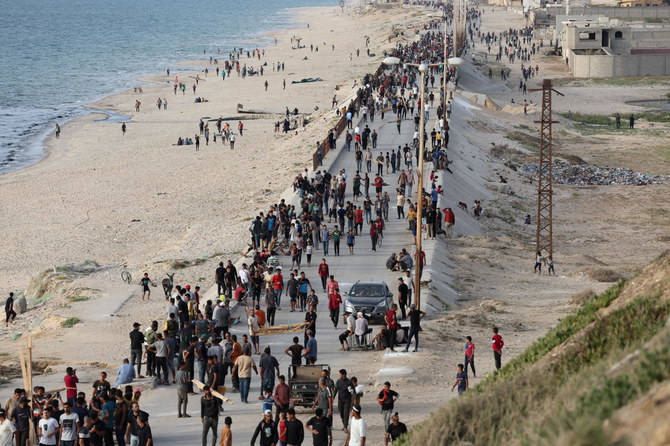DOHA: The stranglehold on aid reaching Gaza threatens an “apocalyptic” outcome, the UN’s humanitarian chief Martin Griffiths said on Sunday as he warned of famine in the besieged territory.
“If fuel runs out, aid doesn’t get to the people where they need it, that famine, which we have talked about for so long, and which is looming, will not be looming anymore. It will be present,” Griffiths said.
“And I think our worry, as citizens of the international community, is that the consequence is going to be really, really hard. Hard, difficult, and apocalyptic,” he told AFP on the sidelines of meetings with Qatari officials in Doha.
An Israeli incursion into the southern Gaza city of Rafah, launched in the face of international outcry, has deepened an already perilous humanitarian crisis in the Gaza Strip.
Griffith, the UN’s Under-Secretary-General for Humanitarian Affairs and Emergency Relief Coordinator, said some 50 trucks of aid per day could reach the hardest-hit north of Gaza through the reopened Erez crossing.
But battles near the Rafah and Kerem Shalom crossings in Gaza’s south meant the vital routes were “effectively blocked,” he explained.
“So aid getting in through land routes to the south and for Rafah, and the people dislodged by Rafah is almost nil,” Griffiths added.
The UN said on Saturday that 800,000 people had been “forced to flee” Israel’s assault on Hamas militants in Rafah.
With fuel, food and medicine running out, Griffiths said the military action in the southern Gazan city was “exactly what we feared it would be.”
“And we all said that very clearly, that a Rafah operation is a disaster in humanitarian terms, a disaster for the people already displaced to Rafah. This is now their fourth or fifth displacement,” he said.
With key land crossings closed, some relief supplies began flowing in this week via a temporary, floating pier constructed by the United States.
Griffiths said the maritime operation was “beginning to bring in some truck loads of aid” but he cautioned “it’s not a replacement for the land routes.”
The war began after Hamas’s unprecedented October 7 attack on Israel, which resulted in the deaths of more than 1,170 people, mostly civilians, according to an AFP tally based on Israeli official figures.
Israel’s retaliatory offensive against Hamas has killed at least 35,386 people in Gaza, mostly civilians, according to data provided by the Hamas-run territory’s health ministry.
Out of 252 people taken hostage from Israel during the October 7 attack, 124 remain held in Gaza including 37 the army says are dead.
On Thursday, the Arab League called for a UN peacekeeping force to be deployed in the Palestinian territories and for an international conference to resolve the Palestinian issue on the basis of the two-state solution.
Griffiths said the statement from the 22-member bloc in Manama was “very important because it focused on the future.”
He explained there were a “number of different conferences being mooted and potentially planned” to discuss humanitarian arrangements in Gaza, including in Jordan.
“I feel very strongly and I know that the Secretary-General feels very strongly that the United Nations needs to be present at the table when all these things are being discussed,” the UN aid chief said.
But he cautioned on the likelihood of a UN peacekeeping force for the Palestinian territories. A proposed deployment could be blocked by a veto from permanent Security Council members, while it would also require the acceptance from the warring parties of the UN’s presence.
The UN announced in March that Griffiths, a British barrister, would step down in June over health concerns.
He said that in recent years he had observed that “the norms that were built up very painfully, indeed since the founding of the United Nations... but particularly in the last couple of decades, seem to have been set aside.”
“There is no consensus on methods of dialogue and negotiation, or mediation, which need to be, in my view, prioritized. And so we have an angry world,” Griffiths said.


























